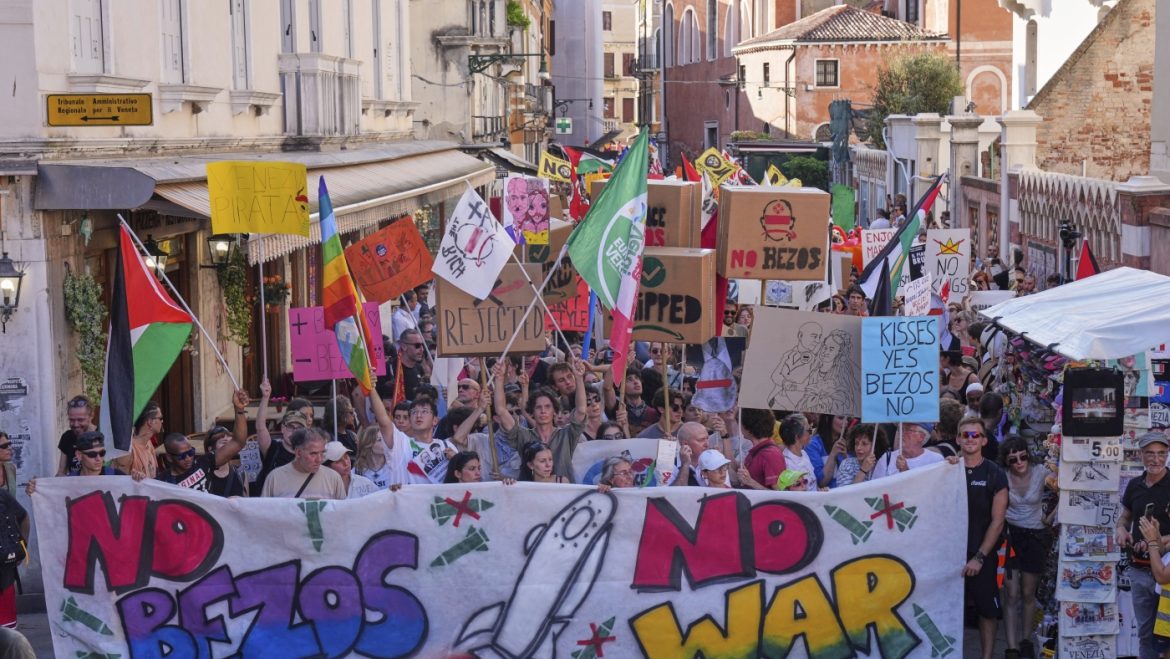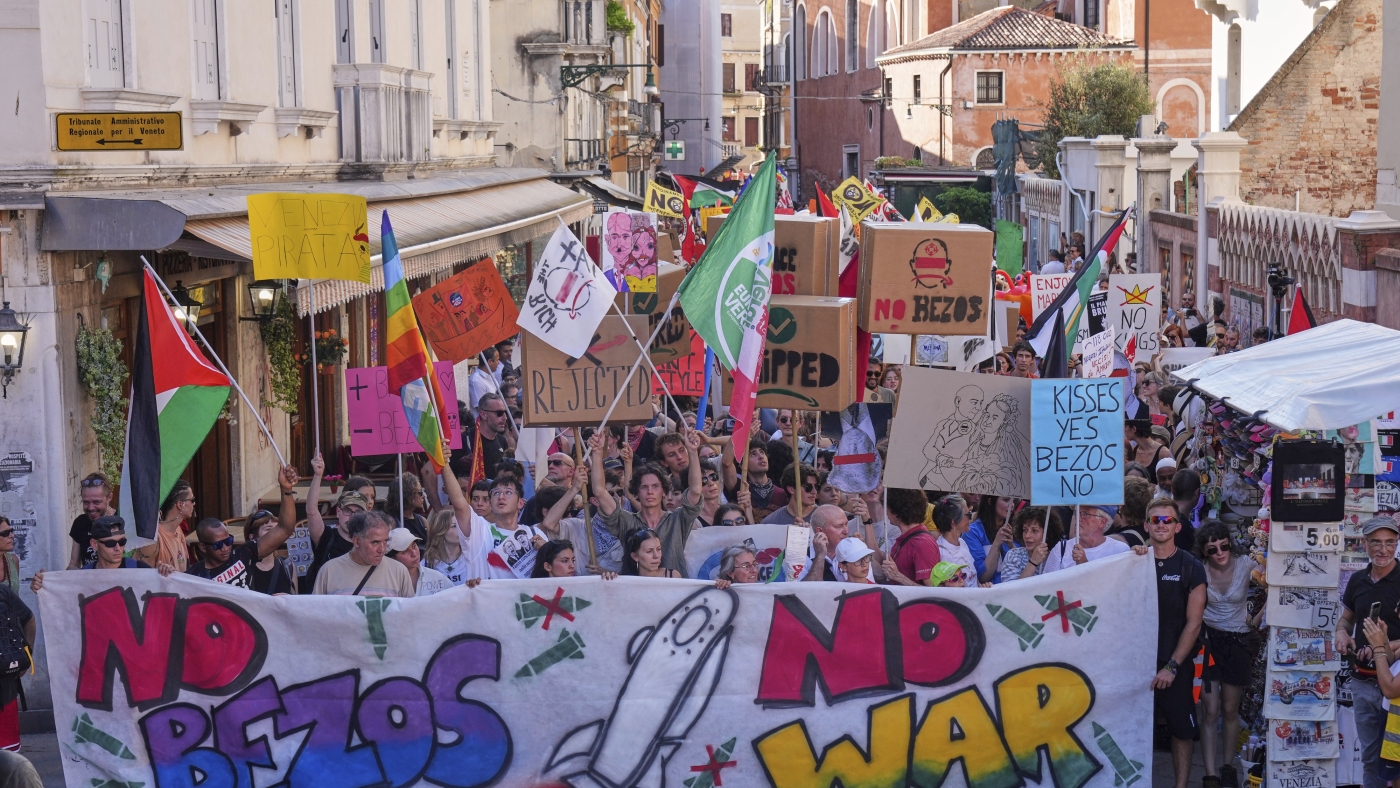The recent wedding of Jeff Bezos and Lauren Sánchez in Venice has ignited a firestorm of public debate, serving as a microcosm of the cultural tensions surrounding wealth, tourism, and local community rights. This event, while ostensibly a private celebration, has become a lightning rod for broader societal issues, particularly in a city already grappling with the consequences of overtourism and the commodification of its cultural heritage.
Venice, a city renowned for its unique architecture and labyrinthine waterways, has long been a magnet for tourists and high-profile events. However, the decision to host a lavish three-day wedding celebration for one of the world’s wealthiest individuals has drawn intense scrutiny. The city’s residents, already vocal about the negative impacts of mass tourism, viewed the event as yet another example of global elites exploiting their city for personal gain. The wedding became a symbol of the broader grievances felt by Venetians, who argue that their city is being transformed into a playground for the rich, with little regard for the local community or the sustainability of the city itself.
The protests that erupted in response to the Bezos wedding were a clear indication of the growing discontent among Venetians. Hundreds of protesters took to the streets, chanting slogans such as “Kisses yes, Bezos No” and “No Bezos, no War.” These slogans underscored the fact that the opposition was not necessarily directed at the celebration of love itself, but rather at the ostentatious and exclusionary nature of the event. The protests, which coincided with the wedding’s final day, highlighted the sustained discontent among locals who feel that their city is being taken over by wealthy outsiders.
One of the most significant impacts of the protests was the alteration of the wedding’s main venue, which was forced to move away from Venice’s city center due to mounting pressure and logistical challenges. This shift was seen by protesters as a victory, demonstrating that civic activism can influence even the most high-profile events. The ability of the protesters to effect change in this way underscores the growing power of grassroots movements in shaping the future of historic urban spaces.
The controversy surrounding the Bezos wedding in Venice brings to light several underlying issues that are relevant not only to this city but to many other historic and tourist-heavy destinations around the world. One of the most pressing concerns is the issue of overtourism and its impact on the accessibility and livability of cities. Venice, in particular, has been struggling with an influx of tourists that has strained its fragile infrastructure and diluted the quality of life for its residents. The arrival of well-heeled guests and the exclusive access to locations typically open to the public raised concerns about the equitable use of the city’s spaces and the long-term sustainability of its tourism model.
Another key issue highlighted by the protests is the stark contrast between the vast wealth of individuals like Jeff Bezos and the socio-economic realities of many Venetians. The wedding was seen as a display of wealth that was disconnected from the lived experience of locals, many of whom face high costs of living and job insecurity. This economic disparity has fueled resentment among residents, who feel that their city is being used as a backdrop for the extravagant lifestyles of the global elite, while they themselves struggle to make ends meet.
The protests also reflected broader concerns about the commodification of cultural heritage. Venetians fear that their city’s rich history and unique architecture are increasingly being treated as a backdrop for spectacle and commercial gain, rather than as a living, breathing community. This erosion of authentic community life is a growing concern in many historic cities, where the influx of tourists and high-profile events can disrupt the social fabric and cultural identity of the local population.
Environmental impact is another critical issue that emerged from the controversy. Large-scale events like the Bezos wedding can exacerbate the environmental pressures already facing delicate ecosystems like Venice’s waterways and architecture. The increased foot traffic and overcrowding associated with such events can cause significant damage to the city’s fragile infrastructure, further threatening its long-term sustainability.
The public sentiment surrounding the Bezos wedding in Venice highlights the need for a more conscientious approach to event planning in historic urban spaces. While the wedding itself was a celebration of love and attracted international attention, the clamor from Venetians underscored the importance of balancing the needs of visitors with the rights and well-being of the local community. The protests were not driven by personal animosity toward Jeff Bezos or the celebration itself, but rather by a desire to address the systemic inequalities and disruptions that such events can reinforce.
The “Kisses yes, Bezos No” movement articulates a nuanced rejection of the excesses associated with high-profile events, while still acknowledging the human moments behind them. This sentiment reflects a growing global awareness of the need to reconcile the benefits of tourism and global wealth with the preservation of local values and sustainability. The protests in Venice serve as a powerful reminder that cities must find ways to welcome celebrations and tourism while also preserving their cultural and social integrity.
The controversy surrounding the Bezos wedding in Venice offers several key lessons for the future of historic cities and their relationship with tourism and wealth. One of the most important takeaways is the crucial role of community engagement in the planning of large-scale events. Involving local residents in the decision-making process can help to prevent alienation and ensure that the benefits of such events are shared more equitably. This approach can also help to mitigate the negative impacts of overtourism and the commodification of cultural heritage.
Another lesson is the need to reevaluate tourism models in cities like Venice. Rather than prioritizing short-term financial gains from elite visitors, tourism strategies should focus on long-term livability, environmental preservation, and cultural respect. This shift in approach can help to ensure that historic cities remain vibrant and sustainable for future generations.
The symbolism of high-profile events like the Bezos wedding cannot be overlooked. Such events often become symbolic battlegrounds over social justice, cultural identity, and power dynamics, influencing public perception well beyond their immediate context. The protests in Venice demonstrate the power of activism in shaping urban life and the importance of addressing the underlying issues that fuel such movements.
The frictions seen in Venice are unlikely to dissipate soon, as the city continues to grapple with the challenges of overtourism and the commodification of its cultural heritage. However, the episode serves as a valuable lens through which to examine the delicate balancing act required to honor history, support residents, and adapt to the realities of a globalized world. In preserving the soul of Venice, it is essential to account not only for the grandeur of celebrations but also for the voices of those who call the city home. The “Kisses yes, Bezos No” movement is a chapter in this ongoing dialogue between tradition, modernity, and the right to a city that belongs to all who live in it.


